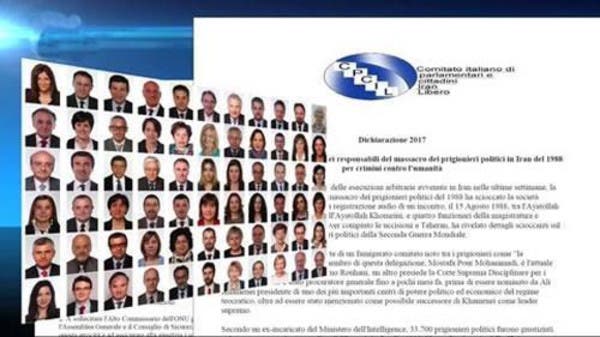
العربية.نت - صالح حميد
طالبت أغلبية البرلمان الإيطالي بمعاقبة مسؤولي مجزرة الإعدامات الجماعية ضد #السجناء_السياسيين في #إيرانعام 1988 والتي نفذت بأمر مرشد النظام الإيراني الأول #الخميني.
ودعا النواب الموقعون إلى اعتبار هذه المجازر بمثابة "جريمة ضد الإنسانية" خلال بيان وقع عليه كل من نائب رئيس#البرلمان_الإيطالي و5 من وكلاء وزراء الحكومة الإيطالية و4 من الوزراء السابقين للبلاد، بالإضافة إلى زعيمي اثنين من الأحزاب الإيطالية والعشرات من رؤساء اللجان البرلمانية ونوابهم.
وأشار البيان إلى الوثائق التي كشفت أخيراً بالتزامن مع ازدياد وتيرة الإعدامات التعسفية في إيران عن تفاصيل جديدة عن مجزرة إعدام حوالي 30 ألف سجين سياسي في العام 1988، حيث أصيب المجتمع الإيراني بصدمة.
وفضح تسجيل صوتي بتاريخ 15 أغسطس/آب 1988 في اجتماع بين آية الله حسين علي منتظري، خليفة خميني آنذاك، و4 من أعضاء "لجنة الموت" الذين كانوا من مسؤولي السلطات القضائية والاستخبارات وكانوا مشرفين على تنفيذ تلك المجازر.
وكان أحد أعضاء "لجنة الموت" الأربعة، هو مصطفى بورمحمدي وزير العدل الحالي بحكومة الرئيس #حسن_روحانيوإبراهيم رئيسي، القاضي والنائب العام الذي عينه المرشد الأعلى #علي_خامنئي أخيراً رئيساً لإحدى أكبر المؤسسات الاقتصادية والسياسية في إيران والمرشح المحتمل لمنصب #الولي_الفقيه بعد خامنئي.
وكان المرشد الأعلى الإيراني علي خامنئي، دافع في كلمة في 4 يونيو/حزيران الجاري، عن مجازر الثمانينيات واعتبر أنها جاءت رداً على ما وصفهم بـ"الإرهابيين" و"المنافقين"، في إشارة إلى تصفية آلاف #السجناء من أعضاء منظمة مجاهدي خلق والتنظيمات اليسارية وناشطي القوميات، بسب معارضتهم لنظام ولاية الفقيه.
وبحسب البيان، فقد طالب النواب الموقعون الحكومة الإيطالية بإدانة مجزرة العام 1988ولتشترط مواصلة أية علاقة مع هذا النظام بوقف الإعدامات في إيران.
كما طالبوا كلا من المفوض السامي ومجلس حقوق الإنسان والجمعية العامة ومجلس الأمن الدولي للأمم المتحدة بالضغط من أجل فتح تحقيق بشأن تلك الجريمة الكبيرة وإحالة منفذي وآمري المجزرة للعدالة في جدول أعمالهم.
Comments
Post a Comment